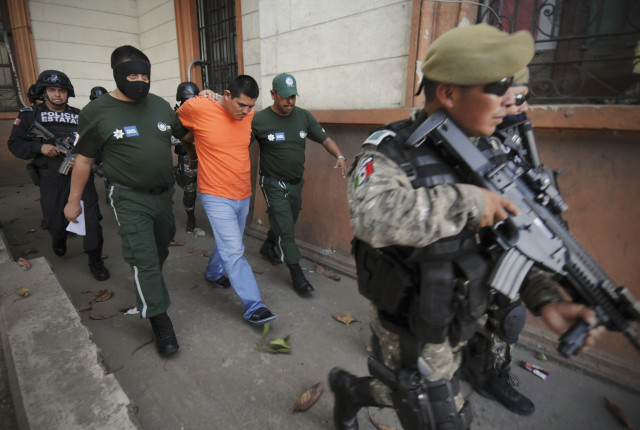
State police officers escort Clemente Martinez, who is arrested in connection with the murder of journalist Moises Sanchez, out of a court house in Veracruz January 26, 2015. Mexican prosecutors are investigating a small-town mayor in connection with the murder of a journalist in the Mexican Gulf coast state of Veracruz, whose brutalized body was found over the weekend, a state official said on Monday. A local drug gang member, confessed to kidnapping and killing journalist Sanchez, in league with five accomplices, Veracruz state prosecutor Luis Bravo said. The accused said he was given orders by a local police official and the bodyguard of Medellin de Bravo Mayor Omar Cruz. REUTERS/Yahir Ceballos
Since 1992, more than 1,000 journalists have been killed while doing their jobs in conflicts across the globe — 61 in 2014 alone, and four of those worked for the Associated Press, the world’s oldest and largest news gathering organization. It was, says the wire service’s CEO Gary Pruitt, as deadly as any year in AP’s nearly 170-year history.
“It used to be that when media wore PRESS emblazoned on their vest, or PRESS or MEDIA was on their vehicle, it gave them a degree of protection,” he told the Hong Kong Foreign Correspondents Club Monday.
“But guess what: That labeling now is more likely to make them a target,” he said.
Last month, AP and a number of other media organizations signed A Call for Global Safety Principles and Practices, which outlines what steps news organizations should take – with both staff and freelancers – to ensure their safety and well-being, calling it a “moral responsibility.”
Before setting out on any assignment in a conflict zone or any dangerous environment, journalists should have basic skills to care for themselves or injured colleagues. – From A Call for Global Safety Principles and Practices, February 2015.
But training alone isn’t enough, said Pruitt. International laws need to change.
“Under existing international law, journalists are considered civilians in conflicts between states,” he said, explaining that currently, it’s the responsibility for each nation to investigate and prosecute those who kill journalists.
“It is at best a patchwork system. At worst, totally ineffective: In 90 percent of journalists’ murders, there are no legal proceedings or investigations. Only four percent of killers are convicted,” he said.
Pruitt is calling for the creation of a new protocol to the Geneva Conventions which would make the kidnapping or killing of journalists a war crime, and he proposes that the International Criminal Court specifically cover the killing of journalists among the other war crimes it investigates.
Maybe this won’t save lives, he told correspondents, but at least it will raise awareness that journalists, like medical professionals, should not be the target of violence in conflict zones.
